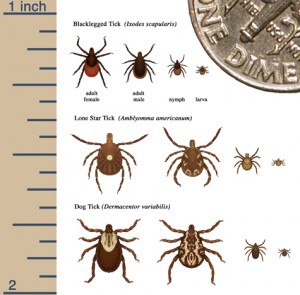
Ticks are not something that the average person in Mississauga tends to think about when they are going for a walk with their dog or letting their cat outside (which, for the record, I don’t condone), but these little critters are finding their way onto our pets more often than ever before!
I remember when I was working with my mentor Dr. Henderson at Queensville Veterinary Clinic back when I was in highschool with great fondness, but I do not remember ticks being a topic of conversation unless you were taking your pet up to a cottage or to Kingston or the Thousand Islands areas. Boy has this changed! Ticks have really started to set up shop in the city, including in the backyards of people living in Mississauga, Toronto, Oakville, and Burlington just to name a few areas! In fact, this summer we have taken a tick off of a 12 week old puppy who had only adventured into the backyard for a potty break and a quick run around! That’s how quickly and easily these parasites can become an issue!
These little disease spreading parasites are sneaky and often very hard to locate on your pet because they can be quite small. This is especially true if your pet has a longer or thicker coat. Ticks tend to fall off of birds passing overhead or squirrels/raccoons/other wildlife and they eventually start looking for their next blood meal. This is usually provided by another wild animal or perhaps your pet or even YOU. They are not picky.
 Tick sizes and types courtesy of www.CDC.org
Tick sizes and types courtesy of www.CDC.org
The tick will bury its mouth parts underneath the skin of its host and will begin drinking blood. While it is doing this, it can pass diseases on to you or your pet depending on the type of tick. The following are the major diseases that we worry about ticks spreading
- Lyme Disease
- Anaplasma
- Babesia
- Erlichia
These diseases can be very serious, and if left untreated, can cause pain and damage to internal organ systems.
So, the magic question is, how do I protect my pet from being a tick’s lunch? As always, prevention is the KEY in these cases, so getting your dog onto a good flea/tick preventative is essential.
Revolution, a very popular heartworm/flea/intestinal worm monthly medication that many people use on their pets, has some activity against the Brown Dog Tick, however, it is not labeled to kill the Deer Tick which is the tick that spreads Lyme disease.
Advantix is another product by Bayer which is a topical flea/tick preventative that claims to kill fleas and ticks before they even bite your pet! This product is likely the best product on the market at this time that concentrated on ticks as a target and yes it IS labeled to kill the Deer Tick as well. However, it does not kill intestinal parasites and it does not protect against heartworm.
I have been recommending for my clients who have at risk dogs to start a regime of Revolution every 4 weeks as well as Advantix every 4 weeks (spread 2 weeks apart for application times) to protect against all of the parasites that we commonly run into. If you don’t like the idea of having to use two topical medications on your dog every month, there is another mediation called Heartgard (an oral medication) that covers intestinal worms and heartworms only, so you can use this in combination with Advantix to get similar coverage.
** IT IS IMPORTANT TO REMEMBER THAT ADVANTIX CAN NOT BE USED ON OR AROUND CATS!** It can and will cause seizures and potentially even death in our feline friends if they come into direct contact with it. Many of the tick preventatives can not be used on cats, so using Revolution is your best bet to keep them as protected as possible.
Check your pet for ticks regularly (I think there’s a country song about this…lol) and if you do happen to find one on them be sure to get them in to see us ASAP so we can remove it properly and send it off to be identified and tested for diseases. If you take the tick off and leave the mouth parts under the skin of your pet it can cause pain and infection later on. Also, remember to have your pets tested with a 4DX test in the spring, not just a heartworm test, to test for tick spread diseases as well. It’s only $20 more and it’s TOTALLY worth it. Remember, just because you didn’t see a tick on your pet doesn’t mean one wasn’t there hiding and having a bite to eat!
If you would like to learn more about ticks, their lifecycle, and the diseases they spread please check out the Companion Animal Parasite Council website at http://www.capcvet.org/
Dr. Christine Nawas, BSc, DVM
(c) Erin Mills Pet Hospital




